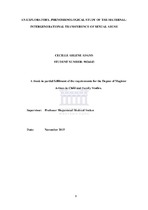An exploratory, phenomenological study of the maternal-intergenerational transference of sexual abuse
Abstract
Childhood sexual abuse transcends boundaries of social class, race, age and gender. Research suggests that its effects are so profoundly debilitating that even in adulthood, victims struggle with a range of emotional, psychological and behavioural challenges. Nationally, South Africa has experienced a high prevalence of childhood sexual abuse, with a noticeable reporting of sexual abuse amongst children whose mothers survived childhood sexual abuse. The current study was aimed at exploring and describing the experiences of maternal survivors of childhood sexual abuse (CSA) whose children also disclosed childhood sexual abuse. It furthermore explored the maternal intergenerational transference of sexual abuse and its influence on parenting, as well as exploring how the experience of childhood sexual abuse influences maternal parental practice and confirms or negates whether sexual abuse is generational. A qualitative research design was used to explore the experiences and perceptions of seven mothers who experienced sexual abuse as children, whose children also disclosed sexual abuse. The sample was purposefully drawn and the interviews were conducted at the premises of two counselling organisations, where they (mothers/children) were receiving counselling. The researcher made use of in-depth interviewing with maternal survivors of childhood sexual abuse whose children also disclosed childhood sexual abuse. The data was collected using an interview schedule with open-ended questions, which facilitated the interview process. Interviews that were conducted with the maternal survivors of childhood sexual abuse were recorded and transcribed verbatim. The data from the study was analysed using thematic analysis, with all data managed manually. Ethical considerations were deliberated to participants who provided signed, informed consent for participation in the study. The findings were revealed in four themes. Theme one describes the experience of loss as a result of the CSA, which included loss of childhood, loss of relationships with family and friends, and loss of parental attachment. Theme two describes the interpersonal and psychological challenges resulting from CSA. A range of psychological and interpersonal sequelae resulting from the CSA experience poses many challenges for the maternal survivor of CSA. These include post-traumatic stress, cognitive distortions, emotional distress, avoidance, and interpersonal difficulties. Theme three describes the barriers affecting the maternal survivor's sense of Self, which includes negative body image and negative self-image. Maternal survivors of CSA struggle with issues pertaining to negative body image, which is as a result of the CSA experience. Issues pertaining to negative self-image were also captured. Theme four describes the parental practice of the maternal survivor and coping capacity, which includes challenges affecting the parental role, the maternal survivor's reaction to her children’s disclosure, as well as the coping strategies adopted to cope and move on. The results of the study show that maternal survivors of CSA experienced a shared feeling of loss, both on a personal level and a relational level. The findings furthermore indicate that the interpersonal and psychological challenges experienced by the maternal survivor are a direct consequence of the CSA and adversely affect the parental role of the maternal survivor. The findings indicate that in cases of intra-familial CSA, the chances are increased for CSA to re-occur in subsequent generations when contact with the mother's perpetrator is maintained. The findings indicate that when CSA occurs in a subsequent generation, regardless of whether intra-familial or extra-familial, maternal survivors are supportive towards their children’s disclosures, as they are confronted with their own CSA experience.

